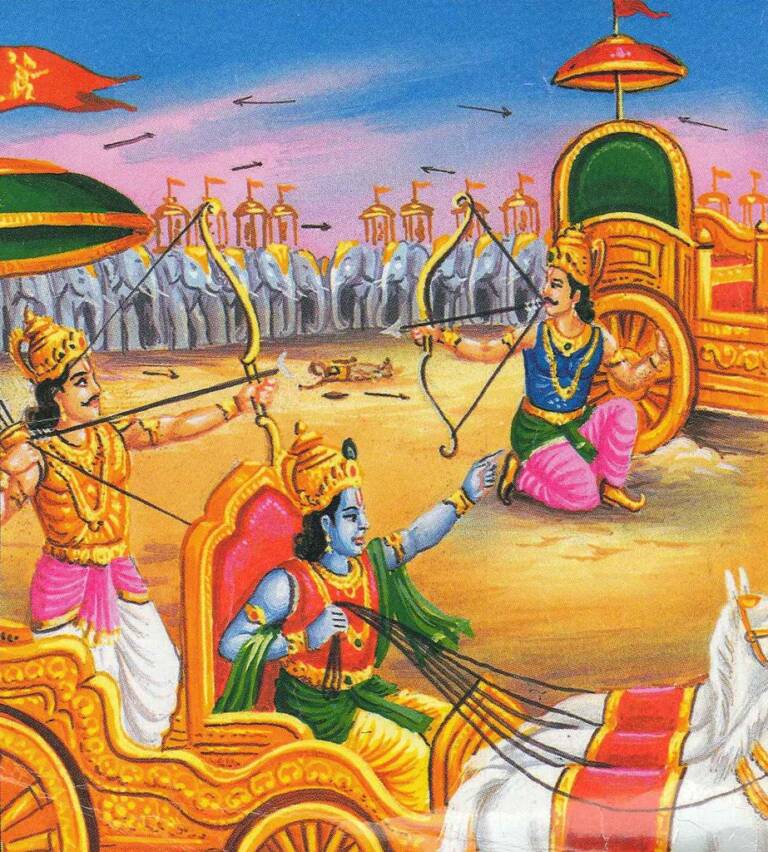Arjuna: The Heroic Archer of the Mahabharata and the Bhagavad Gita
Arjun is one of the central characters within the historic Indian epic, the Mahabharata. He is a heroic prince and a professional warrior recognized for his excellent archery talents and unwavering determination to righteousness.

Family Background:
Arjuna turned into born into the royal own family of Hastinapura, a kingdom in historical India. He became the 1/3 son of King Pandu and his wife Kunti. He was additionally recognised by way of diverse names like Partha, Kaunteya (son of Kunti), and Dhananjaya (one that conquers wealth).
Exceptional Archer:
Arjuna was renowned for his archery abilties, and he become frequently taken into consideration the best archer of his time. He mastered using numerous divine weapons and turned into known for his accuracy and precision in shooting arrows. His mentor in archery was Dronacharya, a mythical trainer.
Role in Mahabharata:
The Mahabharata revolves around the struggle between organizations of cousins, the Pandavas, and the Kauravas, over the throne of Hastinapura. Arjuna turned into one of the five Pandava brothers, along with Yudhishthira, Bhima, Nakula, and Sahadeva.
Character Traits:
Arjuna changed into acknowledged for his virtuous individual, humility, and unwavering adherence to dharma (righteousness). He became not most effective a skilled warrior however additionally a wise and diplomatic prince.
Great Warrior:
Arjuna performed a essential function in the Kurukshetra War, in which he fought valiantly at the aspect of the Pandavas. His archery abilties and management have been instrumental in their eventual victory.
Post-War Life:
After the war, Arjuna and the Pandavas ruled over Hastinapura, but their adventure became full of demanding situations and trials. Arjuna endured to uphold dharma and justice throughout his existence.
Legacy:
Arjuna’s story isn’t only a story of a heroic warrior but additionally a symbol of the everlasting struggle between proper and incorrect, responsibility and preference, and the pursuit of fact and righteousness. His individual and the teachings of the Bhagavad Gita hold to inspire people to lead virtuous lives and make moral alternatives.
Bhagavad Gita:
One of the maximum sizable episodes in the Mahabharata is the Bhagavad Gita, a verbal exchange among Arjuna and Lord Krishna, who served as his charioteer. In the midst of the wonderful Kurukshetra War, Arjuna confronted a ethical dilemma and turned into triumph over with doubt and despair. It became in this second of crisis that Lord Krishna imparted profound non secular understanding and steering to Arjuna, addressing his doubts and encouraging him to satisfy his obligation as a warrior. The Bhagavad Gita is a respected textual content in Hindu philosophy and is taken into consideration a spiritual and philosophical masterpiece.
In precis, Arjuna became a noble and virtuous prince, a grasp archer, and a relevant parent within the Mahabharata, whose journey thru the epic displays the complexities of human life and the eternal quest for righteousness. It is believed that In the Mahabharata, Arjuna’s age at the time of the Kurukshetra War is believed to be in early 30’s.
In the Indian television adaptation of the Mahabharata, which aired in the late 1980s and is still considered one of the most iconic portrayals of the epic, the character of Arjuna was played by actor Feroz Khan. Feroz Khan’s portrayal of Arjuna was widely appreciated for its depth and authenticity, and it remains one of the memorable portrayals of the character in the history of Indian television.
Arjuna's Dilemma/crisis in Mahabharata
Arjuna’s crisis can be summarized as follows:
Moral Dilemma: When Arjuna stood in the battlefield and saw his relatives, friends, and respected elders on both sides of the battlefield, he was overwhelmed by a profound moral challenge his own people also countless lives. He is torn between his duty as a warrior (Kshatriya) and love and respect for his family.
Emotional violence: Arjuna was opposed not only morally but also emotionally. As he contemplated the impending loss of life, the suffering it would cause and the breakdown of family relationships, he felt a great deal of sadness, pity and helplessness He did not want to fight with his family members, teachers and well-wishers.
Doubts and confusions: Arjuna’s mind was filled with doubts and doubts about right and wrong. He questioned the justice of war and the value of victory. He cared about the personal consequences of his actions. In response to Arjuna’s predicament, Lord Krishna, who acted as his charioteer, guide and divine guru, gave the teachings of the Bhagavad Gita. In the Bhagavad Gita, Krishna imparts spiritual wisdom and guidance to Arjuna, addressing his concerns and clarifying several points:
Duty (Dharma): Krishna explains that Arjuna’s duty as a Kshatriya is to protect Dharma and justice through his role as a warrior. Even when he is at war with his relatives, he fulfills his duties as a warrior.
Refusal: Krishna advises Arjuna to be absorbed in his responsibilities and not to get emotionally involved in success or failure. In this way, he can maintain his inner peace and balance.
Nityaatma: Krishna teaches Arjuna about the eternal Self (body) and the impermanence of the physical body. He urges Arjuna to realize that the soul is eternal and imperishable.
Divine surrender: Krishna advises Arjuna to surrender to the divine will and trust in the guidance of the Supreme Being. He assures Arjuna that he can attain spiritual enlightenment and liberation (moksha) by following his prescribed duties and being selfless.
Arjuna’s ordeal on the battlefield, depicted in the Bhagavad Gita, is a pivotal moment in the Mahabharata, emphasizing issues of duty, morality and spirituality. Krishna’s teachings help Arjuna overcome his doubts and challenges, motivating him to fulfill his role as a warrior with a sense of purpose and perfection.
